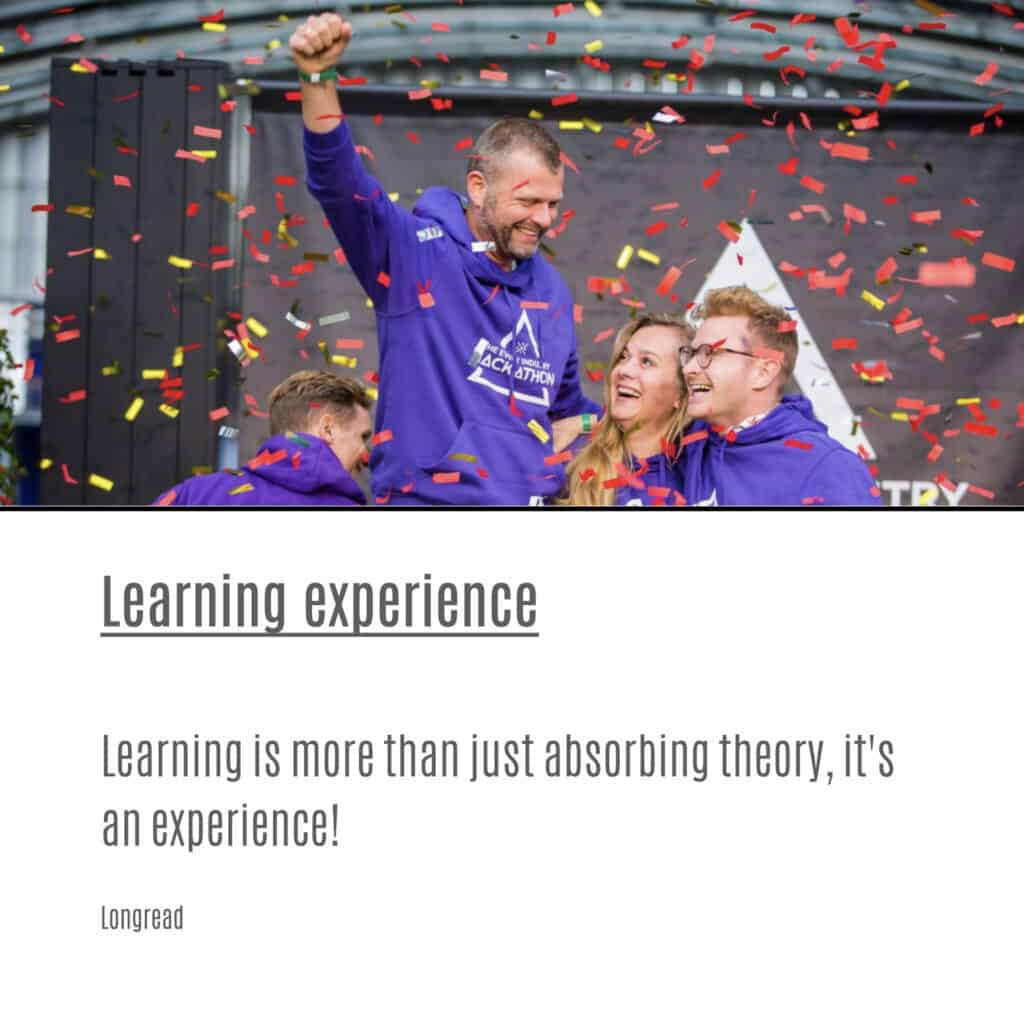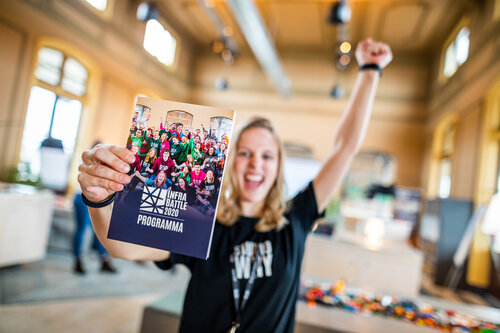

I keep discovering more and more about STUDIO.WHY and learn something new every interview I do. The methods that STUDIO.WHY applies and their mindset is very inspirating. All the pieces that were unknown to me in the beginning are starting fall in its place like one big puzzle. For example Design Thinking creates an entrepreneurial mindset. A facilitator takes care of a good experience and support. And my next step is to know everything there is to know about the Learning Experience. I am speaking with Laurie Mabelis, she is in charge of these learning experiences at STUDIO.WHY.
My first thought when I heard the term “Learning Experience” was rather simple: An experience in where people learn things. But this thought doesn’t justify the true meaning of a learning experience at STUDIO.WHY. It is a lot more than learning new things. The focus is on the combination of having an experience and its learning curve. I notice that Laurie gets really excited when I asked her about the meaning of a learning experience. And her excitement is infectious. Why is a learning experience thát awesome, that people get truly inspired to learn new things and take it with them for the rest of their lives? I am really curious!
Laurie tells me that events are a shot moment in time, where STUDIO.WHY gives people an experience. One where people are guided through the experience and learn to spot opportunities. They last from a few days up to even 2 weeks. The reason we need strong learning experiences is, because through using the strengths of people STUDIO.WHY can really change organizations.
When Laurie is at the beginning of a project, she asks herself: What do we want? We want to excite and inspire! An event is like the kick off of a bigger and longer project, that is supposed to inspire people. After an event the participants should feel that a lot has come their way and it might have been too much to remember it all, but it was an epic experience that has actually taught them something. To achieve that we need to create a momentum in time. A momentum where people truly get motivated to start working on their challenges and projects. Things really need shaking and waking up.
Laurie her enthusiasm is infectious, it sounds really awesome. I am getting excited. The goal is clear: inspire, excite and a kickoff to something amazing. But what does an event look like? Within an experience the steps of Design Thinking are divided into 3 phases, where every day has its own theme.
In the first phase it is all about team dynamics. The participants get to know each other and have to get acquainted with the fact that they are part of multidisciplinary teams. It is important to put different people together. This way they can get insights into different talents, add to it and take advantage of each other. Differences create additions to your talents and new insights to your life. That is why you don’t want to linger in what you know and feels safe. When the teams are formed, they start looking at their case or challenge.
In phase 2 it is all about brainstorming about a concept and building a prototype. The practical part of the event has started. This is done in different, active ways of working. Things like LEGO and drawing are used more than once. This already feels completely different than a normal day at the office, to me. And it are these “abnormal” stimuli that wake people up and gets them excited.
 Phase 3: Share and learn
Phase 3: Share and learnIn phase 3 the teams share their ideas with the group. The team has discovered insights, transformed it into an idea and is bringing it to the group. The intention is not always to find an idea, but to think of one. This doesn’t mean the solution will actually be found, but during the process people will mostly have fun and learn as much as possible. Laurie explains that an event is not focused on the outcome, but on the experience.
Does this mean that people don’t learn anything? Not at all! By focusing on the positive experience, people learn even more. Within an event we see 3 different purposes for our clients:
The purpose of having fun.
The purpose of outcome.
The purpose of learning and having fun
Laurie tells me that purpose number 3 is the most common. Plus it has the benefit of being the most ideal. Laurie’s goal is that the experience on the final day is main subject of conversation on the work floor. Because than something has truly been activated within the people. Of which training people has become a possibility. An event is a tidal wave not small duck pond. You are trying to make an impact. You need something big, a critical point.
How does Laurie look at a learning experience? She answers this question with an interesting analogy. She sees a connection between pitching and the learning experience. What is your message and how doe you make sure come across and most importantly lasts with the receiving party? A pitch is a short story to obtain a goal. With a pitch you try to touch an emotion within someone, this way it will be remembered. With learning experiences it is the same. The focus should be on the experience and therefor the emotion. In that case it will become a personal experience and the feeling will last. After this she asks me: “Can you still remember where you were on vacation when you were 4 years old?” I had to think about that for a while. “I think it was Italy.” I tell her with a fair amount of doubt in my voice. Then Laurie asks me another question: “Now think of you most amazing vacation memory. What is it?” Immediately I answer her: “The dances at the kids club in a hotel.” Excited, Laurie explains that: When you have to remember a fact, it is usually rather difficult, but when you have to remember something that triggered an emotion it is very easy.” She uses this pitching technique within the organization of the experiences. People don’t learn anything from actual numbers. It is the message that gets to them and that’s what people will remember. This way people will keep talking about it and the experience is a success.

When hosting a learning experience STUDIO.WHY deals with different groups of people. Every conversation I wonder: How do you interact with different groups? How do you make sure you’re prepared well enough? Laurie answers me with something I have heard before at STUDIO.WHY: “Be overprepared, but understructured.” Again, you have to anticipate the needs of the group. STUDIO.WHY looks at human being and how his or hers quality can come to life in the best possible way. No experience is the same. They look at what the people need and create the right tool for the job.
Furthermore, Laurie tells me that STUDIO.WHY doesn’t conform to the group, but the group conforms to STUDIO.WHY. She describes this in a beautiful and very clear way: ”What we are trying to achieve is an atmosphere that they are not familiar with. So if we conform to the group there won’t be any change. Change triggers you and those triggers are there to keep people inside the experience. On the other hand, we don’t want people to feel uncomfortable and close themselves to learning. So we don’t push to hard. Not every group is open for everything and it requires empathy to do the right thing.”
I wonder, besides changes and new experiences, how do you make sure that people stay inside the experience? To make sure they don’t get distracted and keep on participating? The answer to this question is in the STUDIO.WHY values.
Have faith. STUDIO.WHY has faith in her participants to want to do things and get the most out of it.
Take responsibility. STUDIO.WHY makes sure there is a strong learning experience and takes full responsibility for it.
Make connection. STUDIO.WHY tries to connect with everyone involved and make them feel wanted and seen.
These expectations are made clear at the beginning of every experience. And the group is made aware of the fact that they are part of a team. If you don’t want to let your team down, you play an active role. In case it does happen that people get distracted or tired, Laurie advises to throw in an energizer. Short exercises that give you a boost, which will help you to go back into the flow.
The amount of tools STUDIO.WHY has, doesn’t stop amazing me. Every question I ask is followed with a logical and clear answer. This proves to me that STUDIO.WHY has a flexible mindset that jumps into the situation to use it optimally. After a positive learning experience the process isn’t done. Behavioral change usually starts after the experience. An event is almost always the kick off to a bigger project. A project where the organization works towards an entrepreneurial culture. The learning experience is the moment where seed is planted to grow into a new way of thinking full of inspiration. And, after this conversation, I am too truly inspired and motivated by Laurie. Talking about a learning experience is and experience in itself!
Designing learning experiences at scale remains a challenge for some. Would you like to know more about learning experiences or the best way to become a more innovative organization? STUDIO.WHY organizes free webinars, free email course or training courses in which you can participate. You can also contact them without obligation for questions or more information.
Subscribe to our 3-weekly newsletter: The Innovators Journey to get valuable insights, tips, resources and special offers to drive change.
We are dedicated to helping individuals and organizations unlock their innovation potential. Our team offers a range of services including webinars, workshops, tailored programs, coaching, and training that can be tailored to fit your specific needs and goals. Whether you are a large group or an individual seeking one-on-one support, we have options to accommodate you. Contact us today to discover how we can help drive innovation and success within your organization.
Education
Public Service
Healthcare
Infra & Mobility
Tech & ICT
Food & Pleasure
Finance
STUDIO.WHY
Genteldijk 5
4191 LD Geldermalsen
The Netherlands